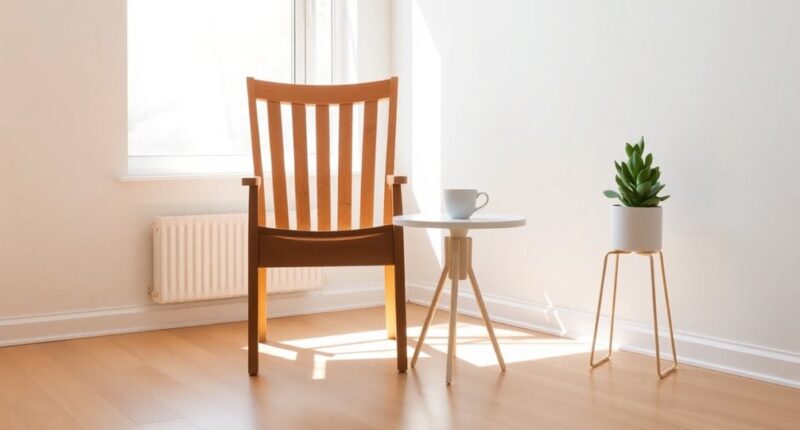A minimalist lifestyle focuses on intentional living, helping you prioritize what truly matters in your life, like meaningful relationships and personal growth. It encourages you to declutter and simplify your surroundings, reducing distractions that harm your well-being. You can challenge consumerism by embracing experiences over possessions and fostering mindful spending habits. By gradually adopting minimalist principles, you'll find greater peace and clarity in your life. There's much more to discover about this transformative way of living.
Key Takeaways
- A minimalist lifestyle emphasizes intentional living by prioritizing what truly matters and reducing distractions through decluttering.
- It focuses on essential possessions that reflect personal values, promoting simplicity and mindfulness in daily choices.
- Minimalism encourages experiences over material possessions, challenging consumerism and fostering deeper relationships.
- Regular decluttering and mindful purchasing enhance organization, clarity, and financial savings, supporting overall well-being.
- This lifestyle is customizable, allowing individuals to gradually integrate minimalism based on their unique values and goals.
Understanding Minimalism

Understanding minimalism can transform your life, as it encourages you to focus on what truly matters. By adopting a minimalist lifestyle, you embrace intentional living, prioritizing quality over quantity. This means owning fewer things that genuinely add value and meaning to your life.
As you declutter your home, you'll notice a reduction in distractions, allowing you to concentrate on meaningful experiences and relationships. Minimalism promotes personal growth, challenging you to rethink societal norms around material accumulation.
It's a customizable approach, so you can shape it to fit your values and goals. Ultimately, embracing minimalism helps you cultivate a clearer mindset and a deeper understanding of what's essential in your life.
The Principles of Minimalist Living
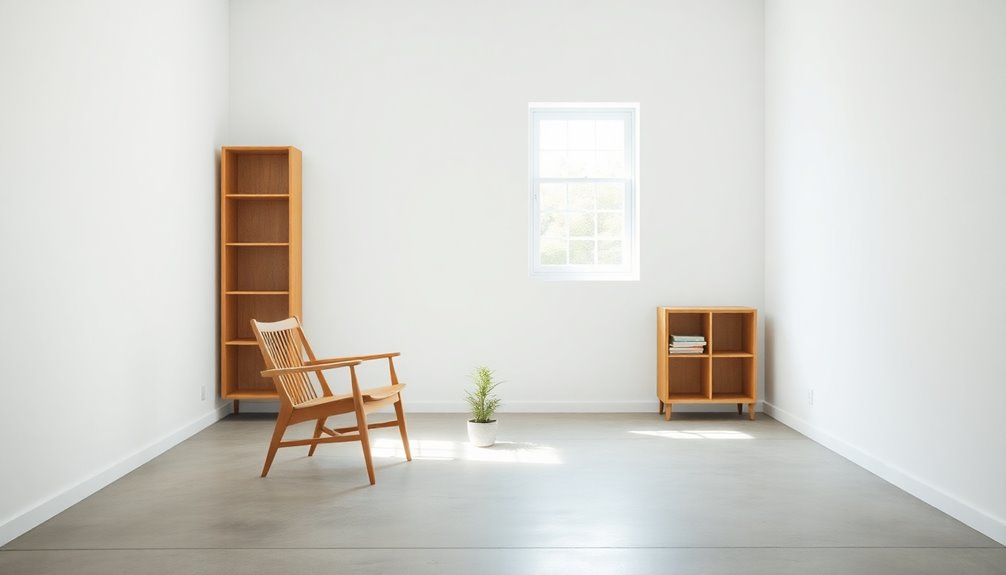
While embracing a minimalist lifestyle, you'll discover that the principles of minimalist living revolve around intentionality, simplicity, and mindfulness.
You'll focus on essential possessions that reflect your values, reducing distractions and clutter. Minimalism challenges consumerism, encouraging you to find happiness in experiences and relationships rather than material accumulation.
Regular decluttering keeps your space organized and promotes clarity. You'll make mindful purchases, prioritizing quality over quantity and opting for multi-functional items.
This intentional living fosters personal transformation, leading to increased freedom, reduced stress, and greater contentment through simplicity.
Common Misconceptions About Minimalism
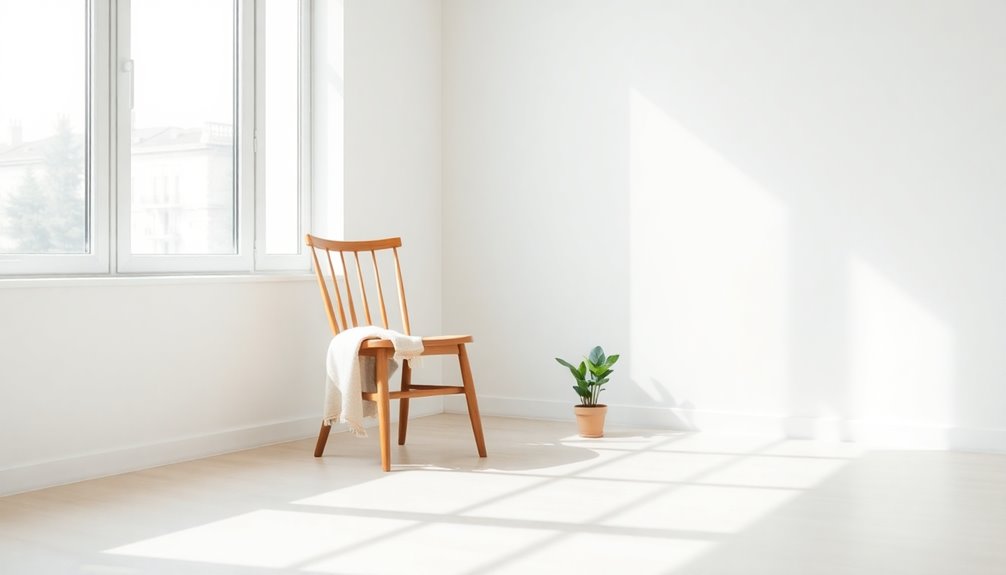
Many people mistakenly believe that minimalism requires strict rules about how few items you can own, but that's far from the truth. It's one of the common misconceptions surrounding this lifestyle.
Minimalism isn't about giving up cherished belongings or hobbies; you can still enjoy your passions while owning fewer material possessions. This lifestyle change can also be a gradual integration, allowing you to adapt at your own pace.
Additionally, minimalism is a sustainable lifestyle choice focused on intentional living, not a fleeting trend. You can embrace minimalist principles while maintaining a career or owning a home—it's all about removing excess.
Ultimately, minimalism encourages you to prioritize what truly matters, creating a more meaningful life.
The Benefits of Embracing Minimalism
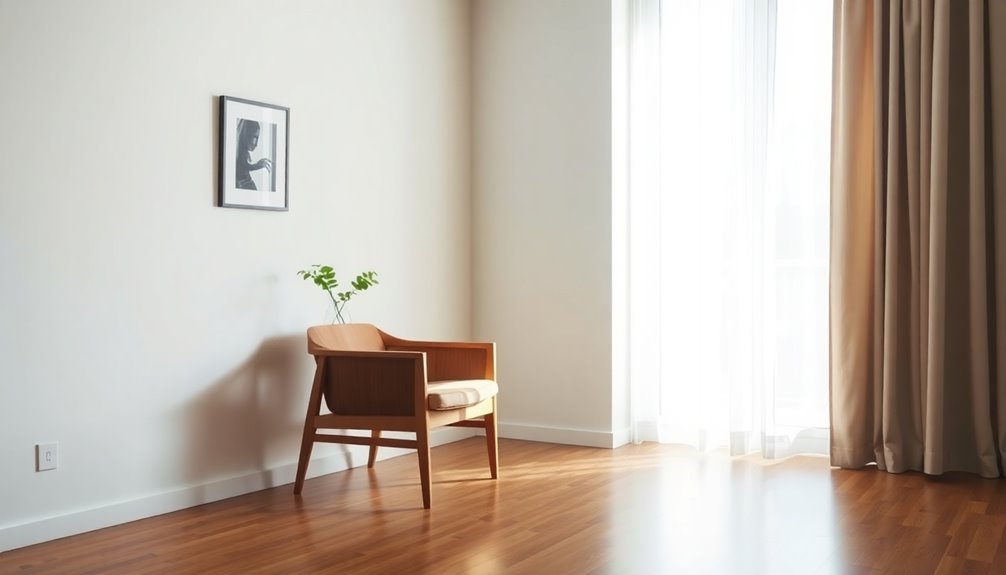
Embracing minimalism can transform your life by reducing stress and creating a more peaceful environment. When you simplify life and reduce clutter, you can focus on what truly matters. This intentional living aligns your choices with your personal values, leading to greater happiness.
By prioritizing experiences over possessions, you foster deeper relationships and meaningful connections that enrich your life. Additionally, adopting a minimalist lifestyle encourages mindful spending, which can lead to significant financial savings and increased freedom.
As you embrace minimalism, you also create space for personal growth, allowing for self-reflection and the pursuit of passions that genuinely fulfill you. Ultimately, minimalism helps you live a more joyful, intentional, and satisfying life. Moreover, it facilitates emotional resilience through reduced distractions, contributing to a more balanced existence.
Practical Steps to Start Your Minimalist Journey
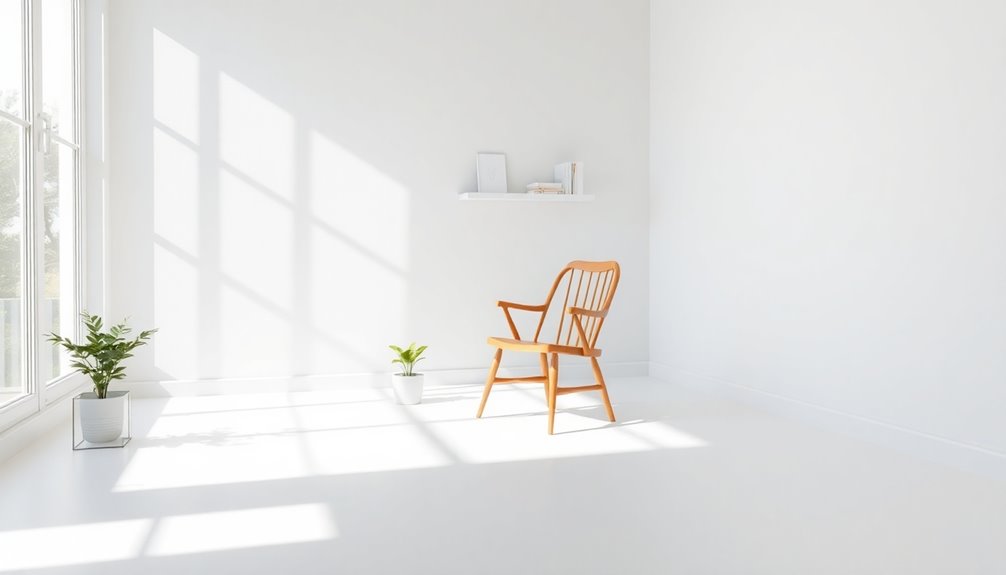
Starting your minimalist journey doesn't have to be overwhelming. Begin by identifying just one unnecessary item to remove from your home, creating an initial sense of space and clarity.
Implement small changes, like organizing a single drawer or decluttering your clothing, to ease into this new lifestyle. Regularly practice gratitude by writing down daily items you appreciate, helping you focus on what you already have.
Schedule routine decluttering sessions, such as once a month, to maintain a minimalist space and prevent clutter. Consider exploring a capsule wardrobe, curating versatile pieces that reduce decision fatigue.
These practical steps will set you on the right path, making your minimalist journey manageable and rewarding.
Minimalism in Everyday Life
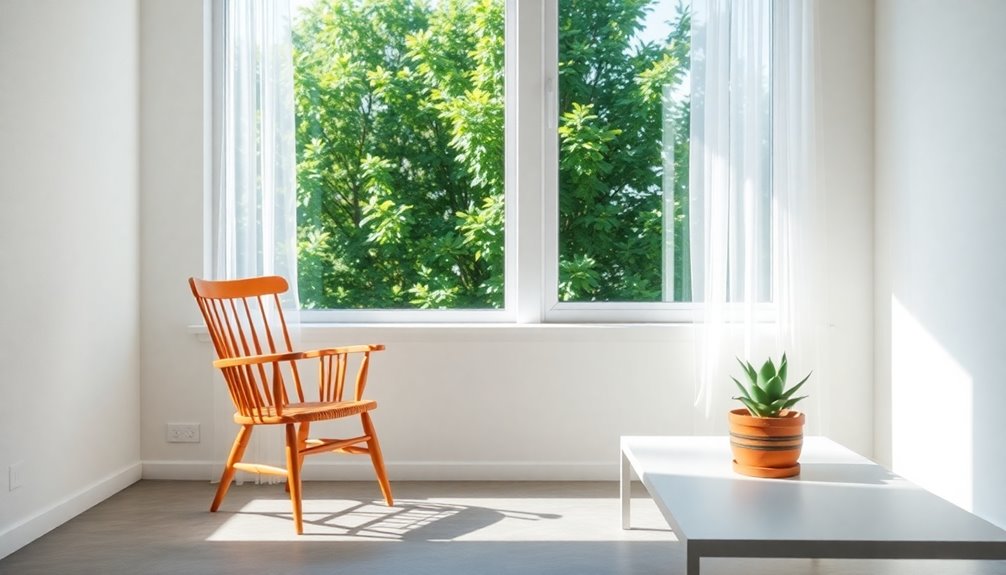
While adopting a minimalist lifestyle may seem challenging at first, integrating minimalism into your everyday life can lead to profound changes in how you experience the world.
By focusing on simple living, you can reduce mental clutter and enhance your happiness. Here are three ways to embrace minimalism daily:
- Declutter Regularly: Clear out unnecessary items from your physical space to create a more peaceful environment.
- Prioritize Experiences: Invest time in relationships and experiences that bring you joy instead of accumulating material possessions.
- Practice Mindfulness: Engage in gratitude exercises to appreciate the essentials, fostering intentional living and emotional well-being.
Embracing these practices as a minimalist can help you cultivate a fulfilling and balanced life.
Challenges Faced in Minimalist Living
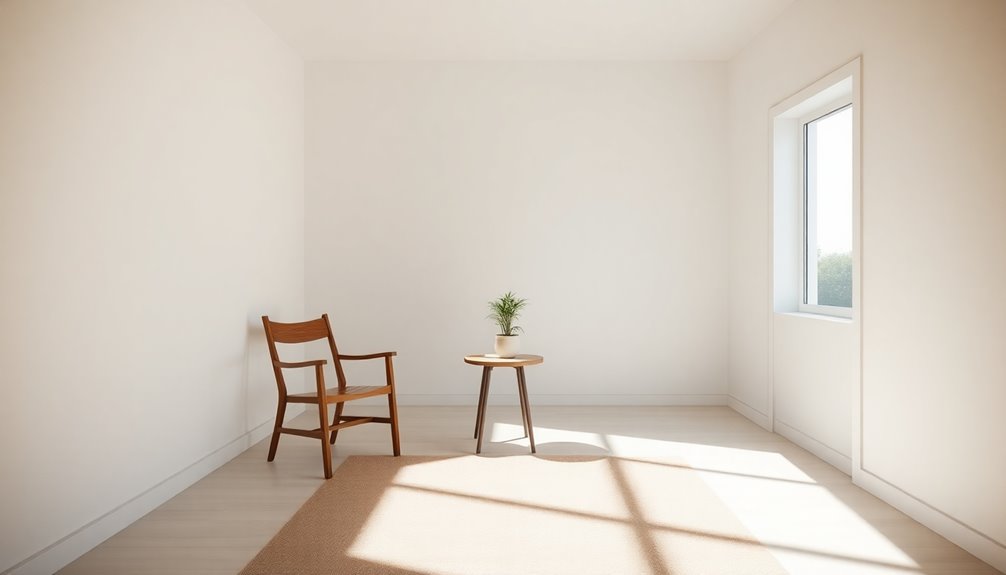
Shifting to a minimalist lifestyle can be more challenging than you might expect, especially when emotional attachments to possessions come into play.
During the decluttering process, you may feel resistance, as letting go can stir up memories and feelings. Additionally, societal pressure often discourages rejecting consumerism, making it hard to embrace minimalism fully.
You'll need a significant mindset shift to prioritize intentional living over ingrained shopping habits. In a consumer-driven environment, maintaining minimalism demands constant vigilance against new items that threaten your space.
Finding a balance between minimalism and necessary possessions, like tools for work or hobbies, can also present challenges as you navigate your unique needs and values. Embracing this journey takes patience and commitment. Moreover, understanding the emotional journey of decluttering can help you navigate the feelings that arise during this process.
Personal Stories of Minimalist Transformation
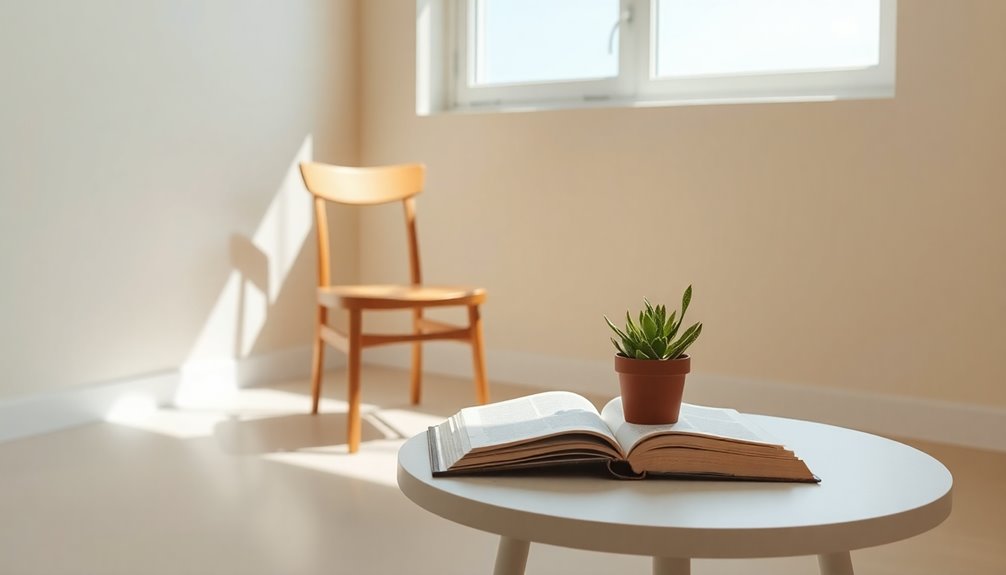
How does one's life change when embracing minimalism? You might experience profound transformation as you let go of possessions and emotional stress. By decluttering, you create clear space in your life, leading to increased freedom and happiness.
Here are three key areas where you'll notice change:
- Personal Growth: Focusing on what truly matters fosters deeper relationships and enhances your overall well-being.
- New Habits: A structured approach, like a 21-day plan, helps establish enjoyable decluttering routines.
- Emotional Clarity: Clearing your space leads to improved mental clarity, allowing you to prioritize health and happiness.
Incorporating self-care practices into your minimalist lifestyle can further enhance your emotional well-being.
Ultimately, minimalism isn't just about belongings; it's a pathway to a more fulfilling life.
Frequently Asked Questions
What Is an Example of a Minimalist Lifestyle?
An example of a minimalist lifestyle could be you living in a cozy apartment with only essential furniture and a small selection of versatile clothing.
You might prioritize experiences, like traveling or exploring new hobbies, rather than buying new items.
Regularly decluttering your space, you remove anything that doesn't serve a purpose or bring joy.
You also digital declutter, limiting your online presence to focus on what truly matters in your life.
What Is the 30 Day Rule in Minimalism?
The 30-Day Rule in minimalism challenges you to systematically declutter your space. Each day, you remove a specific number of items—starting with one on day one, two on day two, and so on, until you reach thirty.
How Do You Live a Minimalist Life?
To live a minimalist life, you've got to let go of the clutter that weighs you down while embracing what truly matters.
Start by identifying your values and decluttering one item at a time, creating space for freedom.
Choose a capsule wardrobe that reflects your style and reduces decision fatigue.
Focus on experiences over possessions.
What Is a Minimalist Person Like?
A minimalist person is intentional and mindful in how they live.
You'll notice they prioritize experiences over possessions, often surrounding themselves with items that truly matter. Their spaces are organized and free from clutter, which helps reduce stress.
They invest in quality, multifunctional items that enhance their life rather than fill it.
You might find them reflecting on what brings joy and meaning, fostering deeper connections and a slower, more fulfilling pace of life.
Conclusion
Embracing a minimalist lifestyle is like shedding heavy layers in a sunlit room, revealing the beauty beneath. As you clear away the clutter, you'll find clarity and purpose blooming in every corner of your life. Each step you take on this journey invites serenity and freedom, allowing your spirit to dance unencumbered. So, plunge into, strip away the excess, and watch as simplicity transforms your world into a canvas of possibilities waiting to be painted.
